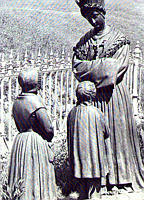The public virtue of oligarchs
Florida Gov. Jeb Bush, amnesic that his own state is still whupped from last year's catastrophic weather and only at the midpoint of this year's storm season, nobly offers Florida's "resources" to the storm-ravaged people of the northern Gulf Coast.
Not begrudging any help - they certainly need it. It's just that these statesmen appear to function in temporal vacuums. When they address the latest emergency, they act as if there were no other realities, no other potentialities, no other obligations, no other possible avenues of action.
News and rulers seem to follow the same cycle: Forget, command, control, forget. Nothing on their radar screen five minutes ahead, or behind. No fore and aft. No phronesis. Broadcast media requires it anyway. The obsessional gaze. The hero must make a grand stand. Strut while sufferers fret. Watch the Towers collapse five million times.
The other day, a woman whose home suffered fairly heavy hurricane damage last year in Florida shared with me an enlightening story of the ways of home insurance:
Her family happened to have an adjuster who worked for two companies. He told them that they were lucky he was working for the insurance company they were with. That company, he told them, was very good to its customers. Sent checks promptly, didn't niggle every penny. The other company he worked for was making life hell for its customers. Took forever to pay, argued every nickle. He did the same work for both - damage reports and estimates - but with diametrically opposite results. (I can personally vouch for the fact that the bad company he worked for was all he said it was.) Many people blamed their particular adjusters, missing the point.
This advice will seem premature to the folks in Miss. and Ala. and La. who are now without power, phone, water, bug spray, AC, dryness and decent food, but it's going to acquire relevance for some in the coming days:
If and when you are attempting to deal with your insurer, remember, it's not about the adjuster. It's about who pays him. If he's giving you a hard time, it's time to talk to your state regulators and perhaps to a public adjuster -- a reliable one. (These are people licensed to do the same thing private insurance adjusters do, but they do it for you, not against you.)
Brave windblown media folk never seem to figure it out: The business of risk is not a risky business. The insurance industry either raises rates or cuts and runs.
Which brings us back to the sanguinity of our Mr. and Master Bushes: You will send in the troops, and make large gestures, as you did here on Florida's Gulf Coast last year. And then you will fail to do anything about the white collar thugs whose good hands will dick around with homeowners who have lost everything in Gulfport, Miss. and environs. New Orleans is good at funerals anyway.
You never think in terms of what you actually can do to help the community of people you pretend to lead. That would involve statesmanship. Instead, like the agencies you are charged with managing, you go on about your business (strutting) while the unobtrusive matter of learning from the past, and anticipating the future, continues to make no news.



